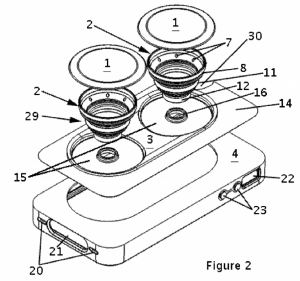 PopSockets LLC is a Boulder, Colorado-based company that designs and manufactures mobile accessories. Its flagship product, the PopSockets Grip, is a phone grip and stand that is collapsible, customizable, and re-positionable.
PopSockets LLC is a Boulder, Colorado-based company that designs and manufactures mobile accessories. Its flagship product, the PopSockets Grip, is a phone grip and stand that is collapsible, customizable, and re-positionable.
PopSockets’ Grip is protected by PopSockets’ U.S. Patent No. 8,560,031, titled Extending Socket for Portable Media Player. On June 14th, the U.S. International Trade Commission (ITC) issued a general exclusion order which prohibits the importation of any collapsible sockets for mobile electronic devices that infringe upon PopSockets’ ’031 patent.
PopSockets filed its Section 337 complaint with the ITC last April, naming 14 respondents, with 13 based in China and one operating in Hong Kong. This February, the administrative law judge (ALJ) assigned to the case found that not only did the accused products infringe PopSockets’ ‘031 patent, but the infringement was widespread, going beyond the 14 named respondents, such that a general exclusion order was warranted, barring the import of infringing products into the United States by anyone, not just the named respondents.
According to Kelly Frazier, PopSockets’ Director of Intellectual Property and Brand Protection, importation of infringing grips is a major problem with hundreds of thousands being shipped into the United States from overseas. “We have one of the largest counterfeiting and knockoff problems of major consumer brands,” Frazier said.
Although the dollar amounts are confidential, Frazier noted that PopSockets suffering due to the infringing imports was amplified by consumer confusion. “Everywhere you could look, you would see fake PopSockets products, which interfered with the sale of legitimate units,” Frazier said, adding that the problem was prevalent both through online retailers and brick-and-mortar stores.
According to Frazier, there have been hundreds if not thousands of companies involved in counterfeit operations. “The difference between a general exclusion order and a limited exclusion order is that the limited order would have only prevented the companies named in the Section 337 complaint from importing,” Frazier said. “We are pleased that the ITC agreed with us that a general exclusion order is necessary to stop all infringers, not just those we identified in our complaint.” Frazier was also successful in obtaining a general exclusion order in 2013 at her previous job with OtterBox, who later acquired LifeProof.
One reason a general exclusion order for patent infringement was important to PopSockets is that the companies selling counterfeit units were infringing on the ‘031 patent but weren’t using any of PopSockets’ trademarks. “The infringers knew better than to use our registered trademark,” Frazier said, adding that U.S. Customs and Border Protection (CBP) often relies on registered trademarks in order to seize infringing goods. “CBP has mechanisms in place to register trademarks within their system in order to seize counterfeit products. Many infringers aren’t always using our trademarks, so instead of going after these infringers individually in costly and sometimes lengthy US District Court actions, we decided to assert our utility patent with the ITC in order to obtain a general exclusion order,” she said.
For innovative startups which are trying to protect their sales and ward off potential infringers, Frazier noted that companies have a wide array of intellectual property strategies to pursue, including applying for trademarks for both their product names and the company’s name. “What tends to happen with a popular product is that infringers will latch on to a trade name, so the first thing that should naturally occur is filing for trademarks,” Frazier said. She also noted that design patents can be an important part of a company’s IP portfolio along with utility patents, but she acknowledged that the costs of filing for patents can be difficult for a small company with limited resources. “PopSockets is lucky to be growing well, and has the support of finance and executive leadership, to afford such IP investments,” Frazier said.

![[IPWatchdog Logo]](https://ipwatchdog.com/wp-content/themes/IPWatchdog%20-%202023/assets/images/temp/logo-small@2x.png)

![[Advertisement]](https://ipwatchdog.com/wp-content/uploads/2024/04/Artificial-Intelligence-2024-REPLAY-sidebar-700x500-corrected.jpg)
![[Advertisement]](https://ipwatchdog.com/wp-content/uploads/2024/04/Patent-Litigation-Masters-2024-sidebar-700x500-1.jpg)

![[Advertisement]](https://ipwatchdog.com/wp-content/uploads/2021/12/WEBINAR-336-x-280-px.png)
![[Advertisement]](https://ipwatchdog.com/wp-content/uploads/2021/12/2021-Patent-Practice-on-Demand-recorded-Feb-2021-336-x-280.jpg)
![[Advertisement]](https://ipwatchdog.com/wp-content/uploads/2021/12/Ad-4-The-Invent-Patent-System™.png)






Join the Discussion
One comment so far.
Software Inventor
August 2, 2018 05:04 pmCongrats to the counsel for her wise strategy and enforcement results!